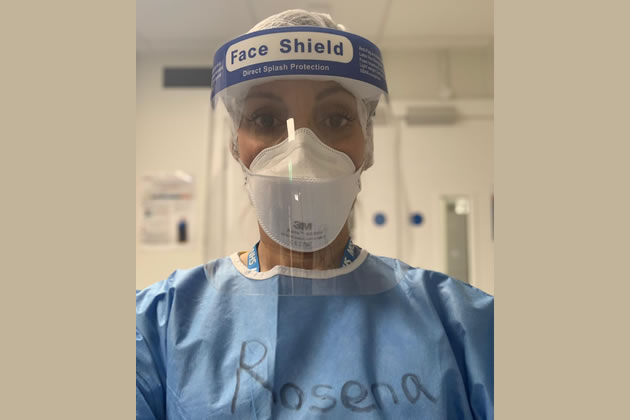Local MP on Life Working on the Frontline Against Covid-19
Rosena Allin-Khan describes the 'deeply disturbing' scenes she has seen

Rosena Allin-Khan in a mask
Doctor and Tooting MP Rosena Allin-Khan has described the “deeply disturbing” scenes she has seen in London’s hospitals while working during the coronavirus pandemic.
She said she has recently treated people in their twenties, and is concerned by the disproportionate impact the virus is continuing to have on people from BAME and deprived communities.
She told the Local Democracy Reporting Service, “When I meet patients, and particularly when I work in intensive care settings, like in the Nightingale, or more recently in East London, and you are able to look down a ward of beds, they are disproportionately filled with people from deprived and BAME communities. And that’s a very sad fact.”
She said the current situation in London’s hospitals is “exhausting” especially for staff who have not had time to recover from the first wave.
“I think also in this wave, one of the things that is quite difficult to deal with is that people seem to be younger, it feels as though people are affected that are younger.
“I had two patients yesterday on shift, one of whom was 36, and one of whom was 28. It’s deeply disturbing to see because sometimes the patients are younger than the people caring for them,” she said.
However, she is keen to stress that despite the pressures on hospitals, the NHS remains open for business.
“If people are unwell or they’re worried that they’ve got symptoms of a stroke or a heart attack or anything, then please come to hospital. Our doors are open for you.
“I know that it can be very daunting, you know, seeing images on the TV and in the papers. And it is very scary. But we are open for business. If people are worried they must come to us or they must call their GP. But also, if people are well, they need to really observe the rules. Please stay at home and help us in the NHS to help them,” she said.
She also believes that the vaccine rollout is offering some hope, but says the government needs to work with community leaders to re-establish trust among BAME groups.
Speaking after a roundtable on the way community pharmacists can be used to help with the vaccine rollout, she said: “I think a huge issue surrounding vaccine uptake at the moment is about trust. Trust in the government, but also trusting the people who are going to be actually delivering it, and then trust that it’s going to work and be safe, and I think this is where community pharmacists have a huge role to play, particularly in making sure that black and minority ethnic communities take the vaccine.
“It was interesting that SAGE research that came out over the weekend and showed black and minority ethnic groups are far less likely to take the coronavirus vaccine, and the most diverse areas of my own community are seeing lower uptakes of the vaccine,” she said.
She argued people have long-standing relationships with their pharmacies – with many people attending the same one for their entire lives, for everything from their yearly flu vaccine, to advice on a minor medical problems.
She said using local pharmacies is an important way to tackle vaccine hesitancy and target communities where there is an issue with vaccine uptake.
One London pharmacist explained that among her staff, they can speak 78 different languages – crucial for explaining the importance and safety of the vaccine to their diverse local communities.
Another, said he had been asked by members of the Islamic community about whether the vaccine is halal.
These questions are not addressed by traditional government communications, but can be discussed with local pharmacists who know their communities and are trusted by them, said Dr Allin-Khan.
Sian Bayley - Local Democracy Reporter
January 20, 2021
Related links
|
Covid-19 Infections Double in a Week in Wandsworth Borough Domestic Abuse Survivor from Wandsworth Calls For Safe Refuges Register for your newsletter from: |